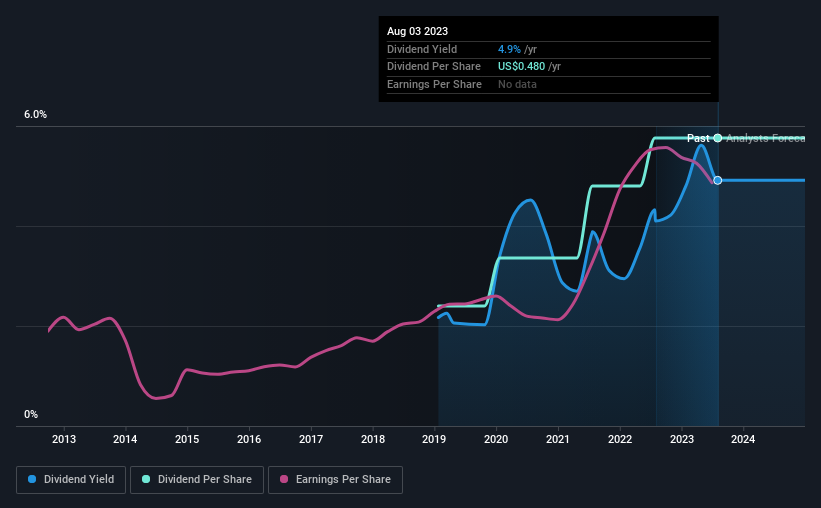OP Bancorp (NASDAQ:OPBK) Could Be A Buy For Its Upcoming Dividend
Regular readers will know that we love our dividends at Simply Wall St, which is why it's exciting to see OP Bancorp (NASDAQ:OPBK) is about to trade ex-dividend in the next 4 days. The ex-dividend date is one business day before a company's record date, which is the date on which the company determines which shareholders are entitled to receive a dividend. The ex-dividend date is of consequence because whenever a stock is bought or sold, the trade takes at least two business day to settle. Thus, you can purchase OP Bancorp's shares before the 9th of August in order to receive the dividend, which the company will pay on the 24th of August.
The company's next dividend payment will be US$0.12 per share, on the back of last year when the company paid a total of US$0.48 to shareholders. Last year's total dividend payments show that OP Bancorp has a trailing yield of 4.9% on the current share price of $9.77. Dividends are an important source of income to many shareholders, but the health of the business is crucial to maintaining those dividends. As a result, readers should always check whether OP Bancorp has been able to grow its dividends, or if the dividend might be cut.
View our latest analysis for OP Bancorp
Dividends are typically paid from company earnings. If a company pays more in dividends than it earned in profit, then the dividend could be unsustainable. OP Bancorp has a low and conservative payout ratio of just 25% of its income after tax.
Companies that pay out less in dividends than they earn in profits generally have more sustainable dividends. The lower the payout ratio, the more wiggle room the business has before it could be forced to cut the dividend.
Click here to see the company's payout ratio, plus analyst estimates of its future dividends.
Have Earnings And Dividends Been Growing?
Stocks in companies that generate sustainable earnings growth often make the best dividend prospects, as it is easier to lift the dividend when earnings are rising. Investors love dividends, so if earnings fall and the dividend is reduced, expect a stock to be sold off heavily at the same time. That's why it's comforting to see OP Bancorp's earnings have been skyrocketing, up 24% per annum for the past five years.
The main way most investors will assess a company's dividend prospects is by checking the historical rate of dividend growth. In the last four years, OP Bancorp has lifted its dividend by approximately 24% a year on average. Both per-share earnings and dividends have both been growing rapidly in recent times, which is great to see.
The Bottom Line
From a dividend perspective, should investors buy or avoid OP Bancorp? When companies are growing rapidly and retaining a majority of the profits within the business, it's usually a sign that reinvesting earnings creates more value than paying dividends to shareholders. This is one of the most attractive investment combinations under this analysis, as it can create substantial value for investors over the long run. In summary, OP Bancorp appears to have some promise as a dividend stock, and we'd suggest taking a closer look at it.
So while OP Bancorp looks good from a dividend perspective, it's always worthwhile being up to date with the risks involved in this stock. For example, we've found 2 warning signs for OP Bancorp (1 is a bit concerning!) that deserve your attention before investing in the shares.
Generally, we wouldn't recommend just buying the first dividend stock you see. Here's a curated list of interesting stocks that are strong dividend payers.
Have feedback on this article? Concerned about the content? Get in touch with us directly. Alternatively, email editorial-team (at) simplywallst.com.
This article by Simply Wall St is general in nature. We provide commentary based on historical data and analyst forecasts only using an unbiased methodology and our articles are not intended to be financial advice. It does not constitute a recommendation to buy or sell any stock, and does not take account of your objectives, or your financial situation. We aim to bring you long-term focused analysis driven by fundamental data. Note that our analysis may not factor in the latest price-sensitive company announcements or qualitative material. Simply Wall St has no position in any stocks mentioned.

